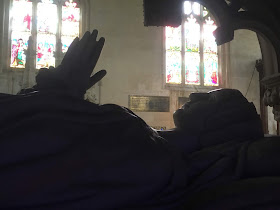by Judith Arnopp
Set against the backdrop of the Cotswolds near Winchcombe in Gloucestershire, a little north of Cheltenham, lies Sudeley Castle. Throughout history Sudeley has been many things; today it is a family home, a beautiful garden, a historic jewel, and the last resting place of an English queen.
Sudeley remained in the hands of Goda’s family until the reign of Henry V when the castle was gifted to Thomas Boteler by way of repayment for his action in the war with France. It was Boteler who began to transform Sudeley into an enviable property, enlarging and updating the existing fabric of the building to create a place fit for royalty.
When the Lancastrians were defeated and Edward IV took the throne the Boteler family were forced out and Sudeley’s passed into the hands of a new owner, the king’s brother, Richard of Gloucester, later King Richard III.
When the tables turned again and Richard was defeated at Bosworth, Henry VII bestowed it on his loyal uncle, Jasper Tudor. After Jasper’s death Sudeley once more became crown property.
Henry VIII visited once with Anne Boleyn. They met with Thomas Cromwell there to discuss the reformation of the monasteries and took a keen interest in the Blood of Christ housed at nearby Winchcombe Abbey. After this the castle was run down and unoccupied for much of the time.
On his accession to the throne, Edward VI made his uncle, Thomas Seymour, Lord of Sudeley and after his marriage to Katheryn Parr, Seymour and his new wife made a home there.
The Seymours implemented many improvements and Katheryn took great care in choosing the décor of the nursery for their expected child. Tragically, to Thomas Seymour’s sorrow and detriment, Katheryn died scarcely a year later, having given birth to a healthy daughter, whom they named Mary. Thomas was executed for treason less than a year later and their child placed in the care of Katherine Willoughby, Duchess of Suffolk, but fades from the historical record shortly afterwards; it is likely that she died in infancy.
With Thomas’ ward, Lady Jane Grey, acting as chief mourner Katheryn was laid to rest in St Mary’s church adjacent to the castle. Today visitors to Sudeley can view a love letter and portrait gifted to the queen by her husband.
Katheryn’s step-daughter and friend, Elizabeth Tudor, later Queen Elizabeth I, visited Sudeley on three occasions during her reign. It is easy to imagine her walking in the garden, remembering her stepmother, recalling conversations and small personal details of their shared life that are now lost to history.
Sudeley’s story doesn’t end with the Tudors. During the civil war Prince Rupert made the castle his headquarters, and Charles I stayed there for a time during the campaign to take Gloucester.
During the course of the war, Sudeley passed back and forth between Royalist and Parliamentarian hands until Parliament ordered the ‘slighting’ of Sudeley making the house indefensible. The roof was removed and afterwards fell swiftly into decay. The fine worked stone was quarried by locals until the castle became nothing more than a romantic ruin. For the next two hundred years, at the mercy of the elements, it became a trysting place for lovers, or a hideaway for thieves.
In 1782, Katheryn Parr’s grave was rediscovered. The lead casket was opened and the body within reported to be 'uncorrupted'. She was reinterred in 1817 by the Rector of Sudeley and a plaque copied from the original inscription on the lead coffin was placed upon it. Today you can see a later, Victorian effigy of Katheryn on the tomb.
Sudeley remained in elegant decay until the nineteenth century when it was bought by two brothers, John and William Dent, who embarked upon a restoration project. They employed architect Sir Gilbert Scott to restore the chapel. The walls and large parts of the castle were restored and the finishing touches applied by Lady Emma Dent who spent almost fifty years restoring and filling Sudeley with fine art and historical artefacts.
The Tudor style parterre we see today is a reconstruction but it is easy to imagine Katheryn there, inhaling the scent of the flowers, the kiss of summer rain on blush pink petals.
While you move quietly between the roses, or pass through the old yew hedges you might imagine her footstep on the gravel behind you, or catch a glimpse of hanging sleeves or the flick of a scarlet kirtle as she turns a corner.

Sunday the 2nd of September 2018 Sudeley Castle is holding a Katherine Parr day! Why not visit it and see for yourself.
Photographs: Sudeley Castle property of Judith Arnopp 2018
~~~~~~~~~
Judith Arnopp is the author of ten historical novels including:
The Beaufort Chronicle: comprising of
The Beaufort Bride – also on Audible
The Beaufort Woman – also on Audible
The King’s Mother - coming soon on Audible
A Song of Sixpence: the story of Elizabeth of York and Perkin Warbeck – coming soon on Audible
The Kiss of the Concubine: A story of Anne Boleyn – also on Audible
The Winchester Goose: at the court of Henry VIII
Intractable Heart: the story of Katheryn Parr
The Song of Heledd
The Forest Dwellers
Peaceweaver
You can learn more about Katheryn Parr’s life in Judith's book
Intractable Heart; the story of Katheryn Parr.
She is currently working on Sisters of Arden, set during the dissolution of the monasteries and the Pilgrimage of Grace. All books on Kindle and in Paperback.














No comments:
Post a Comment
Note: Only a member of this blog may post a comment.